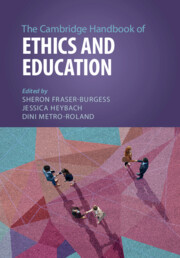Book contents
- The Cambridge Handbook of Ethics and Education
- The Cambridge Handbook of Ethics and Education
- Copyright page
- Epigraph
- Contents
- Figures
- Tables
- Contributors
- Foreword
- Preface
- Acknowledgments
- Part I Traditions in Ethics and Education
- Part II Ethics and Education in Practice
- Part III Emerging Ethical Pathways and Frameworks
- Index
- References
Part I - Traditions in Ethics and Education
Published online by Cambridge University Press: 07 March 2024
- The Cambridge Handbook of Ethics and Education
- The Cambridge Handbook of Ethics and Education
- Copyright page
- Epigraph
- Contents
- Figures
- Tables
- Contributors
- Foreword
- Preface
- Acknowledgments
- Part I Traditions in Ethics and Education
- Part II Ethics and Education in Practice
- Part III Emerging Ethical Pathways and Frameworks
- Index
- References
Summary
This part invites the reader to survey a variety of ethical traditions that have historically informed, and still inform, our educational thought and practice. Dedicating a section to ethical traditions in education comes with obvious challenges. Not only is there an almost infinite number of traditions one could justifiably consider; it is also unclear what traditions rooted in the past can contribute to the complex and ever-changing concerns of the present age. Some of our readers no doubt share Hannah Arendt’s view that the dismantling of metaphysics has also meant that “the thread of tradition is broken and that we shall not be able to renew it,” leaving us with little more than “a fragmented past, which has lost its certainty of evaluation.”
- Type
- Chapter
- Information
- The Cambridge Handbook of Ethics and Education , pp. 1 - 300Publisher: Cambridge University PressPrint publication year: 2024



